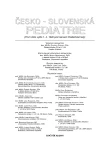Fever at the Child Age. Emotional Background of Febrile State and Therapeutic Efforts of the Parents
Horečka v dětském věku Citové pozadí febrilního stavu a terapeutické snahy rodičů
Účel studie:
Horečka je jedním z nejčastějších příznaků provázejících infekční i neinfekční nemoci v dětství. Je také zdrojem významných obav rodičů z možných následků horečky samotné a jejich přehnaných terapeutických snah, což může způsobit závažné následky. Současná studie měla za cíl načrtnout, které názory a obavy v souvislosti s febrilním stavem jsou v našich podmínkách nejvíce vyjádřené. Dalšími prioritami byla zjištění o preferenci rodičů při výběru konkrétního léčiva a správnosti postupu při jeho použití.
Metodika:
Dotazníkové populační šetření oslovilo rodiče dětí předškolního i školního věku. Otázky byly zaměřeny na osovou dvojici studie: strach z horečky a domácí antipyretická terapie. Dotazy ve vztahu k strachu měly zmapovat emotivní vztah rodičů k horečce tím, že se jim nabízí možnost vyjádřit jejich subjektivní názory. Otázky na postup při antipyretické terapii jsou sformulovány tak, aby zjištěné údaje byly co nejvíce věrohodné a objektivní.
Výsledky:
Fobie z horečky se potvrzuje z více směrů i v našich podmínkách. Dávkování antipyretik ve fázi domácí léčby je značně nejednotné, byla zjištěna široká škála dávek a poměrně četné případy především chronického předávkování.
Závěr:
Výběr vhodných lékových forem je prvořadý – s ohledem na snadné a srozumitelné principy použití (hledisko rodiče), žádaný efekt a správné dávkování (hledisko lékaře). Při sjednocení postupu v antipyretické terapii, v psychologickém vedení a osvětě rodičů nemocných dětí mají klíčové postavení praktičtí lékaři pro děti a dorost.
Klíčová slova:
fobie z horečky, febrilní křeče, nesteroidní protizánětlivé léky, paracetamol, N-acetylcystein, ibuprofen, studený zábal
Authors:
Á. Kerekes
Authors‘ workplace:
Univerzita Karlova v Praze, Lékařská fakulta, Hradec Králové
děkan LF HK prof. MUDr. V. Palička, CSc.
Published in:
Čes-slov Pediat 2007; 62 (11): 610-618.
Category:
Original Papers
Overview
Objective:
Fever is one of the most frequent symptoms accompanying infectious and non-infectious diseases at the child age. It is also a source of important fears of the parents for possible consequences of the fever itself and exaggerated therapeutic efforts, which may result in inadequate therapy of febrile states. The present study was set out to outline the opinions and fears associated with febrile state most often encountered in this country. The parents’ preferences in selecting a specific drug and eventual correctness of their application were the other priorities of the study.
Methods:
A questionnaire population survey addressed parents of children at the pre-school and school age. The questions paid attention to the axis pair: fear of fever and home antipyretic therapy. The questions referring to fear were to map emotional relation of the parents to fever and offered them to express their intuition and subjective opinions. The questions related to procedure in the antipyretic treatment were constructed so as to obtain most reliable and objective data.
Results:
Phobia from fever has been confirmed from various directions also in this country. The dosing of antipyretics in the home phase proved to be considerably variable and examples of chronic overdose were rather frequent.
Conclusion:
The selection of suitable forms is of utmost importance – in view of easy and understandable principles of application (the parent point of view) as well as the desirable effect a correct dosing (the physician’s point of view). In order to unify the procedures in antipyretic therapy and in the psychological conduct, public education, physicians treating children and adolescents play a key role.
Key words:
fever phobia, febrile seizures, non-steroid anti-inflammatory drugs (NSAID), paracetamol, N-acetylcystein, ibuprofen, cold pack
Labels
Neonatology Paediatrics General practitioner for children and adolescentsArticle was published in
Czech-Slovak Pediatrics

2007 Issue 11
- What Effect Can Be Expected from Limosilactobacillus reuteri in Mucositis and Peri-Implantitis?
- The Importance of Limosilactobacillus reuteri in Administration to Diabetics with Gingivitis
-
All articles in this issue
- Ezetimib – Selective Inhibitor of Cholesterol and Its Application in the Therapy of Familial Hypercholesterolemia in Children and Adolescents
- Fever at the Child Age. Emotional Background of Febrile State and Therapeutic Efforts of the Parents
- Child Autism as a Model Disorder with Social Deficit
- Childhood Obstructive Sleep Apnea
- Fragile X Syndrome at the FRAXE Locus: Clinical and Molecular Genetics Diagnosis of Affected Family
- Czech-Slovak Pediatrics
- Journal archive
- Current issue
- About the journal
Most read in this issue
- Fragile X Syndrome at the FRAXE Locus: Clinical and Molecular Genetics Diagnosis of Affected Family
- Childhood Obstructive Sleep Apnea
- Fever at the Child Age. Emotional Background of Febrile State and Therapeutic Efforts of the Parents
- Ezetimib – Selective Inhibitor of Cholesterol and Its Application in the Therapy of Familial Hypercholesterolemia in Children and Adolescents
